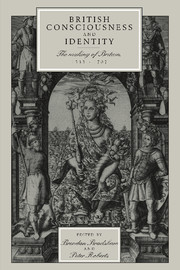Book contents
- Frontmatter
- Contents
- Notes on the contributors
- Preface
- Introduction
- 1 Tudor Wales, national identity and the British inheritance
- 2 The English Reformation and identity formation in Ireland and Wales
- 3 Faith, culture and sovereignty: Irish nationality and its development, 1558–1625
- 4 From English to British literature: John Lyly's Euphues and Edmund Spenser's The Faerie Queen
- 5 The British problem in three tracts on Ireland by Spenser, Bacon and Milton
- 6 James Ussher and the creation of an Irish protestant identity
- 7 Seventeenth-century Wales: definition and identity
- 8 Scottish identity in the seventeenth century
- 9 The Gaidhealtachd and the emergence of the Scottish Highlands
- 10 ‘No remedy more proper’: Anglo-Irish unionism before 1707
- 11 Protestantism, constitutionalism and British identity under the later Stuarts
- Index
3 - Faith, culture and sovereignty: Irish nationality and its development, 1558–1625
Published online by Cambridge University Press: 15 March 2010
- Frontmatter
- Contents
- Notes on the contributors
- Preface
- Introduction
- 1 Tudor Wales, national identity and the British inheritance
- 2 The English Reformation and identity formation in Ireland and Wales
- 3 Faith, culture and sovereignty: Irish nationality and its development, 1558–1625
- 4 From English to British literature: John Lyly's Euphues and Edmund Spenser's The Faerie Queen
- 5 The British problem in three tracts on Ireland by Spenser, Bacon and Milton
- 6 James Ussher and the creation of an Irish protestant identity
- 7 Seventeenth-century Wales: definition and identity
- 8 Scottish identity in the seventeenth century
- 9 The Gaidhealtachd and the emergence of the Scottish Highlands
- 10 ‘No remedy more proper’: Anglo-Irish unionism before 1707
- 11 Protestantism, constitutionalism and British identity under the later Stuarts
- Index
Summary
This chapter is intended to outline and explore aspects of the evolution of Irish nationality and consciousness during the reigns of Elizabeth I and James I. It concludes with a consideration of why the implications of such a development pre-empted the possibility of an easy incorporation of the Irish within an overarching British identity, as successfully undertaken in Wales where the English crown's reforming initiatives over the same period encountered conditions in a Celtic fringe territory in many ways similar to those in the neighbouring island. It spans a period encompassing a process of critical political and social change in Ireland. In a country dominated by regional and localised potentates, and thus lacking an indigenous centralised political structure, it is tempting to infer a corresponding absence of a common political culture, ideology and mode of discourse. Paradoxically, however, the diffused nature of political organisation was counterbalanced by the homogeneity of elite Gaelic culture. The island, with the effective exception of the Pale area in and around the city of Dublin, was characterised by the centuries old and highly refined modes of Gaelic civilisation. Indeed, this Gaelic cultural ambience was not simply an insular phenomenon but extended from the Scottish Hebrides to the southern extremities of Ireland. When the Tudor monarchs began an ultimately cumulative drive to assert hegemony over the quasi-autonomous neighbouring island, they confronted an ancient and sophisticated culture which bound together the decentralised power bases of Ireland. Gaelic cultural dominance was highlighted by the effective acculturation of the descendants of the twelfth-century Anglo-Norman settlers, particularly those beyond the Pale.
- Type
- Chapter
- Information
- British Consciousness and IdentityThe Making of Britain, 1533–1707, pp. 112 - 139Publisher: Cambridge University PressPrint publication year: 1998
- 4
- Cited by

